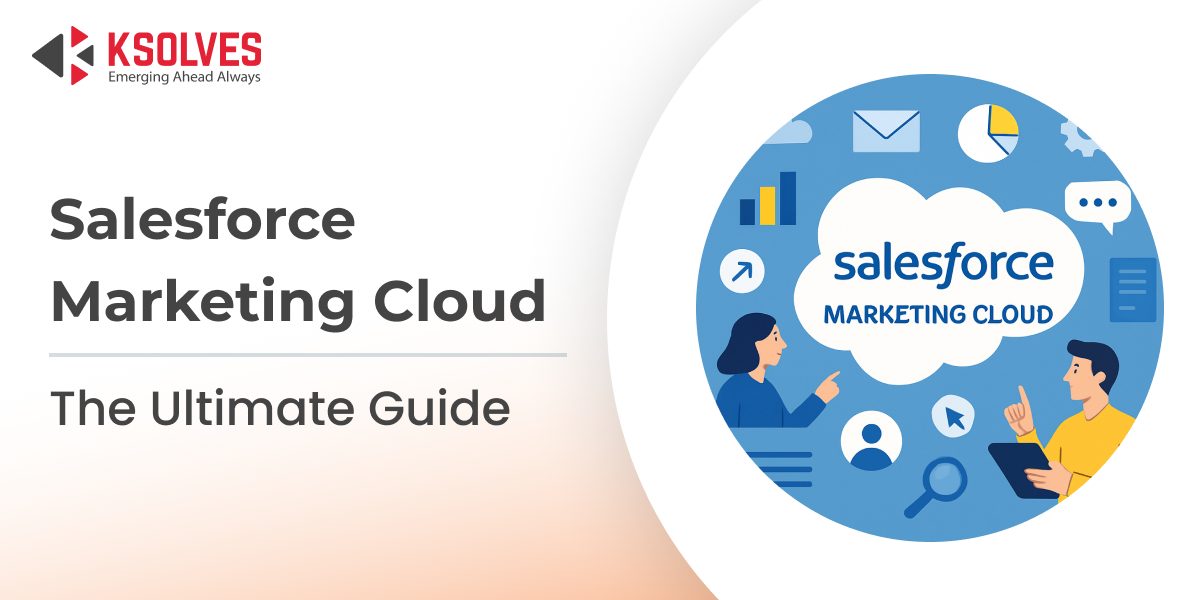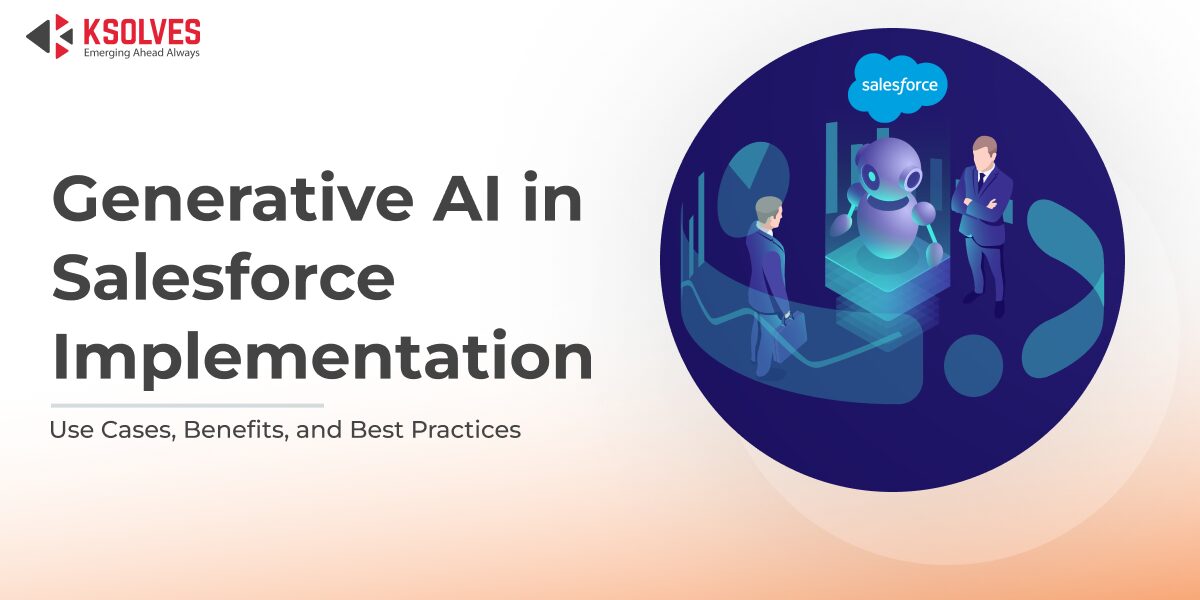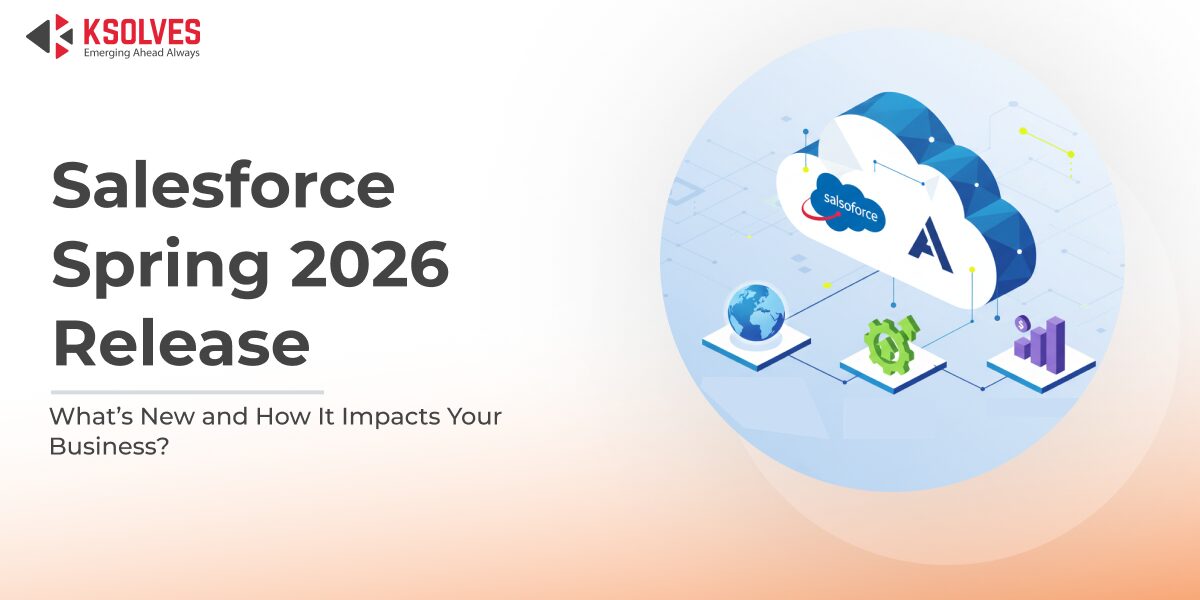Salesforce Marketing Cloud Guide 2025
Salesforce
5 MIN READ
May 9, 2025
![]()

If your B2B marketing team is still juggling multiple platforms to manage campaigns, track engagement, and personalize communication, it’s time for a change. Salesforce Marketing Cloud offers a unified solution to connect with your customers at every stage of the journey efficiently and at scale.
Many businesses struggle with disconnected tools, limited automation, and unclear customer insights. This not only slows down marketing efforts but also affects ROI. With features like Journey Builder, Email Studio, and real-time analytics, Salesforce Marketing Cloud helps overcome these challenges, making your marketing smarter, faster, and more impactful.
In fact, companies using Salesforce Marketing Cloud report a 32% increase in overall marketing ROI and a 32% improvement in customer engagement.
In this Salesforce Marketing Cloud guide, you’ll discover what Marketing Cloud is, how it works, key features, and how it benefits companies. So, let’s dive in!
What is Salesforce Marketing Cloud?
Salesforce Marketing Cloud is a powerful digital marketing platform designed to help businesses connect with their customers through personalized and automated marketing campaigns. It allows companies to manage email, SMS, social media, advertising, and customer journeys from a single platform.
With features like customer segmentation, real-time analytics, and AI-driven insights, Marketing Cloud enables organizations to deliver the right message to the right audience at the right time. It supports marketers in creating data-driven strategies that improve engagement, boost conversions, and build lasting customer relationships.
Key Features of Salesforce Marketing Cloud
With powerful features for personalization, automation, and analytics, Salesforce Marketing Cloud empowers marketers to deliver targeted and meaningful experiences across multiple channels.
- Journey Builder – Journey Builder lets you automate and personalize customer experiences across multiple channels like email, SMS, push notifications, ads, and even IoT devices. You can design multi-step campaigns that adapt in real-time based on how customers behave. This creates seamless, personalized journeys from first contact to post-purchase engagement.
- Audience Builder & Segmentation – With Audience Builder, you can bring together data from various sources, such as CRM, website, and offline systems, to create complete customer profiles. Use this data to segment your audience based on demographics, behavior, interests, or past interactions, so every campaign reaches the right people at the right time.
- Personalization with Einstein AI – Einstein AI brings predictive intelligence to your marketing. It analyzes customer data to recommend the best content, timing, and channels for each individual. This helps marketers deliver personalized messages that drive better engagement, conversions, and customer satisfaction—all powered by machine learning.
- Content Builder – Content Builder is your centralized workspace for creating and managing all marketing assets, such as emails, templates, images, and more. It supports collaboration across teams with features like tagging, approvals, and shared access. This smoothens your content creation process and ensures brand consistency.
- Email, Mobile, and Social Marketing – Marketing Cloud supports cross-channel messaging from a single platform. You can plan, create, and send campaigns via email, SMS, push notifications, and social media. Messages can be automated and personalized based on user behavior, ensuring timely and relevant engagement on preferred channels.
- Automation Studio – Automation Studio allows you to automate marketing tasks such as sending emails, updating records, and triggering campaigns based on customer activity. It’s ideal for complex workflows like onboarding sequences, re-engagement campaigns, or lead nurturing. Everything is set up once and runs automatically.
- Analytics Builder – Analytics Builder helps you track every touchpoint of the customer journey. You get access to dashboards, custom reports, and performance metrics that provide insight into campaign success. These insights help you make data-driven decisions and continuously improve your marketing efforts.
- Marketing Cloud Connect – With Marketing Cloud Connect, you can sync data between Salesforce Marketing Cloud and other Salesforce Clouds (Sales, Service, etc.). This integration allows marketing campaigns to react to real-time data, like purchases, support tickets, or sales interactions, ensuring consistent, personalized communication across departments.
- Data Extensions – Data Extensions let you store extra information about your contacts beyond standard fields. This includes purchase history, location data, or preferences, enabling highly personalized marketing. They are essential for advanced segmentation and delivering messages that truly resonate with your audience.
- Advertising Integration – Marketing Cloud offers built-in tools to manage ads on platforms like Google, Facebook, LinkedIn, and Instagram. You can retarget customers, suppress ads for recent buyers, or launch lookalike campaigns. All of this is done using Salesforce data, helping you increase ROI on your ad spend.
How Salesforce Marketing Cloud Overcomes the Main Challenges of Modern Marketing
Marketers today face numerous hurdles that can hinder effective customer engagement and campaign success. Here’s how Salesforce Marketing Cloud provides powerful solutions to these challenges, helping businesses stay ahead of the curve.
| Problem | Salesforce Solution |
| Digital Fatigue: Customers struggle to identify products amidst the overwhelming exposure to digital channels. | Solution: Use Marketing Cloud Automation Studio to schedule and automate repetitive tasks, reducing manual workload. Personalize communications with Marketing Cloud Personalization Builder to engage the audience meaningfully. |
| Information Overload: Customers’ preferences, contact data, and purchase history are scattered across various sources, making it difficult to create a unified customer profile. | Solution: Leverage AI-driven analytics and predictive insights with Salesforce Einstein in Marketing Cloud to sift through data and highlight key trends. Utilize Marketing Cloud Analytics Builder for clear visualizations and reporting. |
| Increased Competition: The rise of digital platforms has lowered market entry barriers, making it harder to stand out amidst growing competition. | Solution: Use Journey Builder to create personalized customer journeys, powered by AI insights from Einstein, to ensure targeted and relevant interactions that differentiate your business. |
| Data Privacy Concerns: As data-driven marketing grows, so do concerns over data privacy and compliance with regulations. | Solution: Ensure compliance with data privacy regulations by using Salesforce Trust and Marketing Cloud’s built-in security features. Implement consent management tools to protect customer data while still gaining valuable insights. |
| Adapting to Algorithm Changes: Search engines and social media algorithms are constantly changing, making it challenging for businesses to maintain content visibility. | Solution: Stay ahead of algorithm changes by using Marketing Cloud Analytics Builder to monitor performance. Conduct AI-powered A/B testing in Journey Builder to optimize marketing strategies based on real-time data. |
| Shorter Attention Spans: Consumers have less time and patience to engage with content, making it essential to craft compelling messages quickly. | Solution: Design engaging and personalized content using Marketing Cloud Content Builder. Integrate data from other Salesforce Clouds to deliver content tailored to each customer. This results in higher engagement. |
| Balancing Automation and Personalization: Over-relying on automation can lead to a lack of personal touch, while excessive personalization can be time-consuming. | Solution: Combine Marketing Cloud Automation for efficiency with Einstein Personalization Builder for AI-driven personalization. This ensures a balance between automation and personalized customer experiences. |
| Measuring Marketing ROI: With so much data across multiple channels, measuring the return on investment (ROI) and ensuring accurate trend analysis can be challenging. | Solution: Use Data Cloud for Marketing, Analytics Builder, and Audience Builder with Einstein AI to gain comprehensive insights into marketing effectiveness. This leads to optimized campaigns and better customer engagement. |
| Maintaining Trust and Credibility: With the rise of misinformation, it’s harder to build and maintain long-term customer trust. | Solution: Use Journey Builder and Content Builder to craft authentic and transparent communications. Deliver personalized messages that foster trust while leveraging Marketing Cloud features to track brand communication effectiveness. |
Salesforce Marketing Cloud Integrations
Salesforce Marketing Cloud (SFMC) connects directly with Salesforce CRM and other Salesforce Clouds like Sales Cloud, Service Cloud, Commerce Cloud, and Data Cloud. This connection allows real-time customer data sharing between teams, helping create consistent and personalized marketing campaigns.
SFMC also supports integrations with third-party platforms such as Google Analytics, Facebook, Instagram, LinkedIn, and Twitter. These integrations help marketers track performance, analyze customer behavior, and run targeted ad campaigns using unified data.
Salesforce provides a wide range of APIs and pre-built connectors to link external systems, automate workflows, and manage data across platforms without heavy custom development.
Step-by-Step Process to Implement Marketing Cloud
1. Define Your Marketing Objectives
Start with identifying what you want to achieve—whether it’s improved customer engagement, higher lead conversion, or multi-channel automation. Align SFMC use with your broader business goals.
2. Map Customer Journeys
Visualize how your customers interact with your brand across channels. This helps decide which SFMC tools, like Journey Builder, Email Studio, or Mobile Studio, are needed at each touchpoint.
3. Set Up SFMC Environment
Create your Marketing Cloud account and configure business units, sender profiles, and branding. Set up user roles, permissions, and security protocols to align with your organizational structure.
4. Connect Data Sources
Integrate your CRM (like Salesforce Sales Cloud), external databases, and third-party apps. Establish a unified view of your customer data for accurate segmentation and personalized messaging.
5. Organize and Import Data
Structure your data extensions, import subscriber lists, and define data relationships. Clean and validate your data to avoid errors in automation and reporting.
6. Build Campaign Assets
Use SFMC tools like Content Builder and Email Studio to create email templates, landing pages, and forms. Include dynamic content blocks to personalize experiences at scale.
7. Set Up Automation Workflows
Use Automation Studio to schedule recurring tasks—like sending welcome emails, syncing data, or triggering journeys. Build rules to automate communication based on user behavior or milestones.
8. Personalize and Segment
Group your audience by interests, purchase history, location, or engagement level. Use AMPscript and dynamic content to deliver highly tailored content to each segment.
9. Test Everything
Test campaigns across different devices and email clients. Validate all links, images, and personalization rules. Run test sends to ensure proper rendering and functionality.
10. Launch Campaigns
Start small with a pilot campaign or A/B test to analyze initial performance. Gradually expand your reach once everything is performing as expected.
11. Monitor, Analyze & Optimize
Track KPIs such as open rate, click-through rate, and conversions using SFMC’s analytics dashboards. Use the insights to refine future campaigns and improve ROI.
12. Train Teams & Document Processes
Provide hands-on training for users and maintain internal documentation for repeatability. This helps onboard new team members and ensures consistency.
13. Stay Updated & Scalable
Regularly explore new SFMC features and adapt to changes in digital marketing trends. Scale your use of the platform as your business and data grow.
Ways to Make the Most of Salesforce Marketing Cloud
Salesforce Marketing Cloud (SFMC) is a powerful platform designed to streamline marketing, boost engagement, and drive business growth. With its strong integration across the Salesforce ecosystem and with third-party tools, the platform helps businesses manage large volumes of data and use AI to deliver personalized campaigns that increase retention and revenue.
But with so many features and tools available, getting the most out of SFMC can feel overwhelming. Here are a few practical ways to get started:
1. Invest in Learning and Training
To truly understand what SFMC can do, invest time in learning. Salesforce offers Trailhead, a free learning platform that covers all aspects of Marketing Cloud. It helps you explore key features and discover which tools best suit your business goals. Staying updated through Trailhead and other resources will help your team stay ahead.
2. Experiment and Test Your Campaigns
Success with SFMC often comes through testing and fine-tuning. Try out different strategies with A/B testing for emails, experiment with customer journeys, and use data from multiple channels to see what drives the best results. Testing helps you understand what works and what doesn’t for your audience.
3. Work with a Salesforce Consultant
If you’re unsure where to start, bringing in a certified Salesforce consultant can save time and resources. Consultants can help tailor SFMC to your specific needs, optimize your setup, and make sure you’re using the right combination of tools to reach your goals efficiently.
Businesses That Can Harness the Power of Salesforce Marketing Cloud
Salesforce Marketing Cloud is a versatile and scalable platform designed to serve organizations across diverse industries. Its ability to deliver personalized, data-driven marketing at scale makes it an ideal choice for businesses aiming to strengthen customer relationships and drive growth. Here’s how various sectors can benefit from it:
1. E-commerce and Retail
Retailers—both online and offline—can use Marketing Cloud to deliver personalized shopping experiences, recommend products, and launch targeted promotions. This boosts conversions, drives repeat purchases, and builds long-term customer loyalty.
2. Healthcare Providers
Hospitals, clinics, and health networks can use Marketing Cloud to send appointment reminders, wellness tips, and personalized care messages. This enhances patient engagement and improves healthcare outcomes.
3. Financial Services
Banks, insurance providers, and investment firms can leverage Marketing Cloud to offer tailored financial advice, manage ongoing client communication, and build trust through secure and relevant interactions. Read more.
4. Travel and Hospitality
Hotels, airlines, and travel agencies can send personalized itineraries, promotional offers, and booking confirmations, creating a seamless and engaging travel experience for customers.
5. Nonprofits
Nonprofit organizations can increase outreach by running personalized fundraising campaigns, engaging donors with relevant content, and keeping supporters updated on their mission and impact.
6. Higher Education
Universities and colleges can connect with prospective and current students through personalized messaging around admissions, events, course offerings, and more, improving enrollment and retention rates.
7. Automotive Industry
Manufacturers and dealerships can use Marketing Cloud to share service reminders, personalized offers, and product updates, enhancing the customer experience and supporting post-sale engagement.
8. Real Estate
Real estate firms can deliver tailored property recommendations, schedule alerts, and follow-up messages to prospects, helping to accelerate the buying or renting process.
Why Choose Ksolves to Maximize Salesforce Marketing Cloud?
Salesforce Marketing Cloud services are a game-changer for businesses aiming to deliver personalized, automated, and data-driven marketing experiences. But to truly unlock its potential, you need the right implementation partner—one who understands your industry, your goals, and how to connect the dots across the Salesforce ecosystem.
That’s where Ksolves comes in.
As a platinum Salesforce Partner and a trusted ISV and Pledge Partner, Ksolves brings deep technical expertise and strategic vision to every Salesforce Marketing Cloud engagement. Our certified experts help businesses design and execute seamless marketing journeys by integrating Salesforce Marketing Cloud with Sales Cloud, Service Cloud, Data Cloud, and third-party platforms.
Whether you’re in retail, healthcare, finance, education, or any other sector, we tailor our solutions to your unique needs. From initial setup and data integration to automation, personalization, and analytics, Ksolves is with you every step of the way.
Let us help you harness the full power of Salesforce Marketing Cloud and turn every customer interaction into a growth opportunity. Contact us today!
![]()








AUTHOR
Salesforce
Md. Asad Khan, an expert Technical Project Manager at Ksolves, who is a certified Salesforce architect at Ksolves, brings 7+ years of experience. He specializes in FSL, B2B, Service & Sales Cloud, and Non-profit cloud, excelling in APEX, Aura Component Framework, Lightning Components, Triggers, Visualforce, and creating insightful dashboards and reports.
Share with